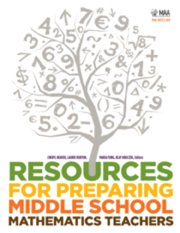Book contents
- Frontmatter
- Preface
- Contents
- I Programs for Middle School Teachers
- B In-service Training Programs
- 5 The Master of Arts in Middle School Mathematics Program at Salem (MA) State University
- 6 The Math in the Middle Institute: Strengthening Middle Level Teachers' Mathematical and Pedagogical Capacities
- 7 A Professional Development Program for Middle School Math Teachers in Maryland
- II Courses for Middle School Teachers
- B Geometry
- C Number Theory and Abstract Algebra
- D Precalculus and Calculus
- E Probability and Statistics
- F Combination Courses
5 - The Master of Arts in Middle School Mathematics Program at Salem (MA) State University
from B - In-service Training Programs
- Frontmatter
- Preface
- Contents
- I Programs for Middle School Teachers
- B In-service Training Programs
- 5 The Master of Arts in Middle School Mathematics Program at Salem (MA) State University
- 6 The Math in the Middle Institute: Strengthening Middle Level Teachers' Mathematical and Pedagogical Capacities
- 7 A Professional Development Program for Middle School Math Teachers in Maryland
- II Courses for Middle School Teachers
- B Geometry
- C Number Theory and Abstract Algebra
- D Precalculus and Calculus
- E Probability and Statistics
- F Combination Courses
Summary
Many educational observers believe that elementary, middle grades, and secondary mathematics teachers need a better understanding of mathematics content. The NCTM, Liping Ma, and many others have used the terms “deep” or “profound” understanding of school mathematics to describe an ideal attribute for a teacher of mathematics [1, 4]. The philosophy behind the Master of Arts in Teaching (M.A.T.) Middle School Mathematics program at Salem State University is based on the idea that middle school mathematics teachers will be more effective in the classroom if they have a deep understanding of mathematics. I will describe the program and the local and national conditions that led to its creation in 2003. It is a small program that seems to be unique in our geographic area for the amount of mathematics it requires.
The M.A.T. program was designed for practicing middle school mathematics teachers who needed a greater understanding of mathematical content. Typically, these teachers were licensed as elementary or middle school generalists and had not taken many mathematics courses as undergraduates. Our M.A.T. program contains more mathematics than other programs for a similar audience. For example the M.Ed. in Middle School Mathematics Education at nearby Lesley University consists solely of education courses [8]. Several pedagogy courses are included in the program and a capstone experience in which teachers implement a project of their own design in their classrooms.
- Type
- Chapter
- Information
- Publisher: Mathematical Association of AmericaPrint publication year: 2013



